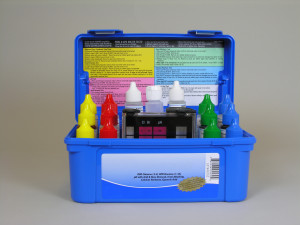What does it all mean?
These unique characteristics mean spas require closer supervision of bather hygiene; a higher minimum level of sanitizer; more frequent testing, especially by commercial operators; more exact chemical treatment; frequent physical cleaning of the interior, deck and filtration system; plus periodic draining and refilling with fresh water.
If you are a spa dealer, customers will need some education from you to understand why they always should test sanitizer and pH levels before entering the spa.
Myth 3: Testing supplies are a commodity; therefore, a wise buyer shops on price
This myth is only embraced by newbies and people who service pools simply as a way station to another line of work. If you have been in business long enough you will come to know the hard way which testing equipment provides results you can confidently base your treatment decisions on. When determining which products have the right features for you and/or your customers, factors such as ease of use, completeness, accuracy and consistency and product availability should be considered.
Ease of use
Manufacturers carefully design test equipment to maximize service life and user productivity, such as withstanding repeated use in wet environments. Indicators of this are tear-resistant, waterproof instructions; vinyl, not paper, bottle labels; and desiccant inside test strip containers.

Other features to look for include products that are free of brittle plastic and small components that can be lost easily; no paper waste to dispose of after testing; and colour standards that are protected from bleaching or scratching. Further, fill marks on sample containers should be moulded, not painted on; and larger equipment cases should have handles.
Finally, kit components should also have a logical arrangement and be easy to take out and put back inside—it is a bonus if there is room in the case to store additional reagents or another small piece of equipment. It is also a big help if reagent caps are colour-coded to the instructions.
Completeness
A good water analysis setup should offer:
- Comprehensive test instructions in simple language.
- A test for free chlorine covering the recommended range in a specific jurisdiction, and a way to determine combined chlorine (either by subtraction from a total chlorine reading or by a direct reading).
- A test for cyanuric acid, the stabilizer used in chlorinated outdoor pools/spas exposed to sunlight.
- A bromine test to service pools/spas treated with this sanitizer. (Note: the bromine value can be approximated by multiplying the chlorine reading by 2.25.)
- All the tests required to determine whether water is balanced, namely pH, total alkalinity and calcium hardness. (Note: a test for total hardness is not as appropriate, but it is the parameter most test strips offer.)
- Acid and base demand tests (liquid reagent kits) for making adjustments to pH.
- A device for calculating the Langelier Saturation Index (LSI) based on water balance readings.
- A summary of recommended ranges for each measurement (or a testing guide that goes beyond the bare minimum of recommended ranges to include helpful information like treatment tables).
- Technical support from the manufacturer.
Result accuracy and consistency
In order to calculate effective treatment chemical dosages, true readings for each test parameter are imperative. If you ever question the accuracy of your readings, use a standard solution, where the concentration of the analyte is already known, in place of your water sample. When proper water testing techniques are employed, the results should match the values printed on the labels of the standard solutions (plus/minus 10 per cent on the alkalinity [AT], hardness and cyanuric acid tests, and plus/minus 0.1 pH units on the pH test).
Product availability
Make sure replacement reagents and parts are readily available, too.
Similar to any business expense, it pays to comparison shop using price as just one of several determining factors. The product with the best value for your needs may not be the cheapest. However, when compared to keeping swimmers healthy, protecting the client’s investment in the pools/spas under your care, and upholding your business reputation, reliable testing supplies are worth every penny.






